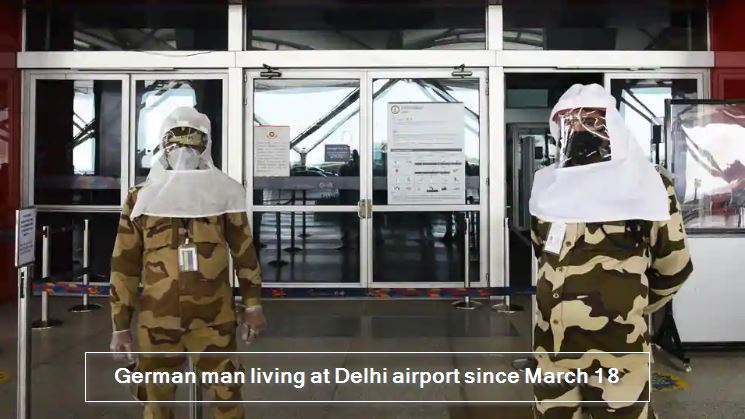German man living at Delhi airport since March 18
The German national, Edgard Ziebat, was on his way from Hanoi to Istanbul on March 18, the day India cancelled all flights to and from Turkey in the wake of the Covid-19 pandemic.
A 40-year-old German man has been living in the transit area of New Delhi’s Indira Gandhi International airport for the past 54 days in a story not dissimilar to that of Viktor Navorski, the fictional character played by Tom Hanks in the 2004 Steven Spielberg film “The Terminal”.
The German national, Edgard Ziebat, was on his way from Hanoi to Istanbul on March 18,the day India cancelled all flights to and from Turkey in the wake of the Covid-19 pandemic. Four days later, India stopped all international flights, and then, on March 25, imposed a national lockdown that is now scheduled to continue till May 17.
While there were other stranded passengers at the airport at the time, what complicated things for Ziebat is that he has a criminal record in his home country, which has refused to take custody of him because he is at a foreign location, according to two security officers from the airport who asked not to be named. India, too, did not give him a visa because of his criminal record, the officers added.
There was no immediate response from the German embassy to calls and text messages regarding the development.
On March 18, Ziebat landed in New Delhi from Vietnam in a VietJet Air flight as a transit passenger to Istanbul, only to realise that all flights to his destination were cancelled, one of the officers cited above said.
“After spending around a week in the transit area, with four other stranded passengers who arrived in Delhi on different dates — two from Sri Lanka and one each from the Maldives and the Philippines — airport authorities alerted their respective embassies,” the officer said.
“While others were facilitated by their embassies concerned and were taken for quarantine, officials from the German embassy informed the Indian bureau of immigration that Ziebat is a wanted criminal in their country with several cases of assault and other crimes registered against him. Since he was on a foreign land, they did not take his custody. The Delhi Police and airport operator DIAL (Delhi International Airport Limited) were also apprised of the situation,” the officer said.
He added that because India did not give Ziebat a visa due to his criminal background — criminal offences are taken into consideration when assessing individual visa cases in India — he remains unauthorised to leave the airport’s transit area. In India, an international passenger can normally stay in transit for just one day, and requires Indian visa to step out of this designated space for travellers passing through the country. The officer added that Ziebat has also not formally applied for an Indian visa.
[amazon box=”B07VJ92G95″ “small”]
In the film, The Terminal, Navorski (played by Hanks) arrives at New York’s John F. Kennedy airport from the fictional Eastern European country Krakozhia, only to discover that the US no longer recognises Krakozhia as an independent country after the outbreak of a civil war, and Viktor is not permitted to either enter the country or return home because he is now stateless. He goes on to stay in the terminal for nine months because he can’t enter the US.
Ziebat, too, has been staying in the terminal with only his luggage. The airport, in any case, has not opened to regular traffic since March 22, but is operating cargo flights and some special evacuation flights, and is currently involved in the massive repatriation exercise in which about 15,000 Indians stranded in 12 countries are being brought to different airports across India in the first week of the operation.
According to the second airport official, Ziebat has mostly spent the last 54 days reading magazines and newspapers, talking to his friends and family over the phone, eating at some of the fast food outlets still in operation within the terminal, interacting with housekeeping and security staff, taking walks within the transit area, and using the airport’s washrooms and toilets. Authorities also provided him with a recliner, mosquito net, toothpaste, food and other basic essentials.
“He told officials that he can manage his expenses. He sleeps on the beds, benches, on the floors, wherever he feels like. He is alone in the transit area as it is not being used because the airport is closed for passengers,” said the second officer.
“We confirm that a foreign national is currently in the transit area of the international terminal of Delhi airport due to non-availability of regular flight to transit onwards. Appropriate authorities were informed about this in good time. They are in dialogue with the foreign national,” a spokesperson for Delhi International Airport Limited (DIAL) said.
HT could not immediately contact Zeibat for a comment.
The second officer cited above said that around mid-April, some officials were worried about Ziebat’s health. “On this, some of the officials were sent to meet Ziebat and they found that he was fine, physically and mentally. He interacted clearly, and was in all his senses. CCTV footage was also checked, and nothing suspicious was found. Since then, some officers visit the German man regularly to interact with him just to get an idea of his well-being,” he added.
During such interactions, the second officer said, Ziebat had said that he can pay for his tickets if his travel is arranged. “It was found that he has visas of multiple countries. The officials concerned have told him that it will only be possible for them to send him away once international flights resume,” the officer added.
No date has been specified for when regular international transit will resume from India.
The officer quoted above said Ziebat was asked to leave and go wherever he wants, but since no flights are operational, he has been stranded. “About a week ago, attempts were also made to accommodate him on a relief flight to Ankara (Turkey) but Turkish authorities turned down the proposal stating that the flight was only for Turkish nationals or for their permanent residents,” the officer said.




